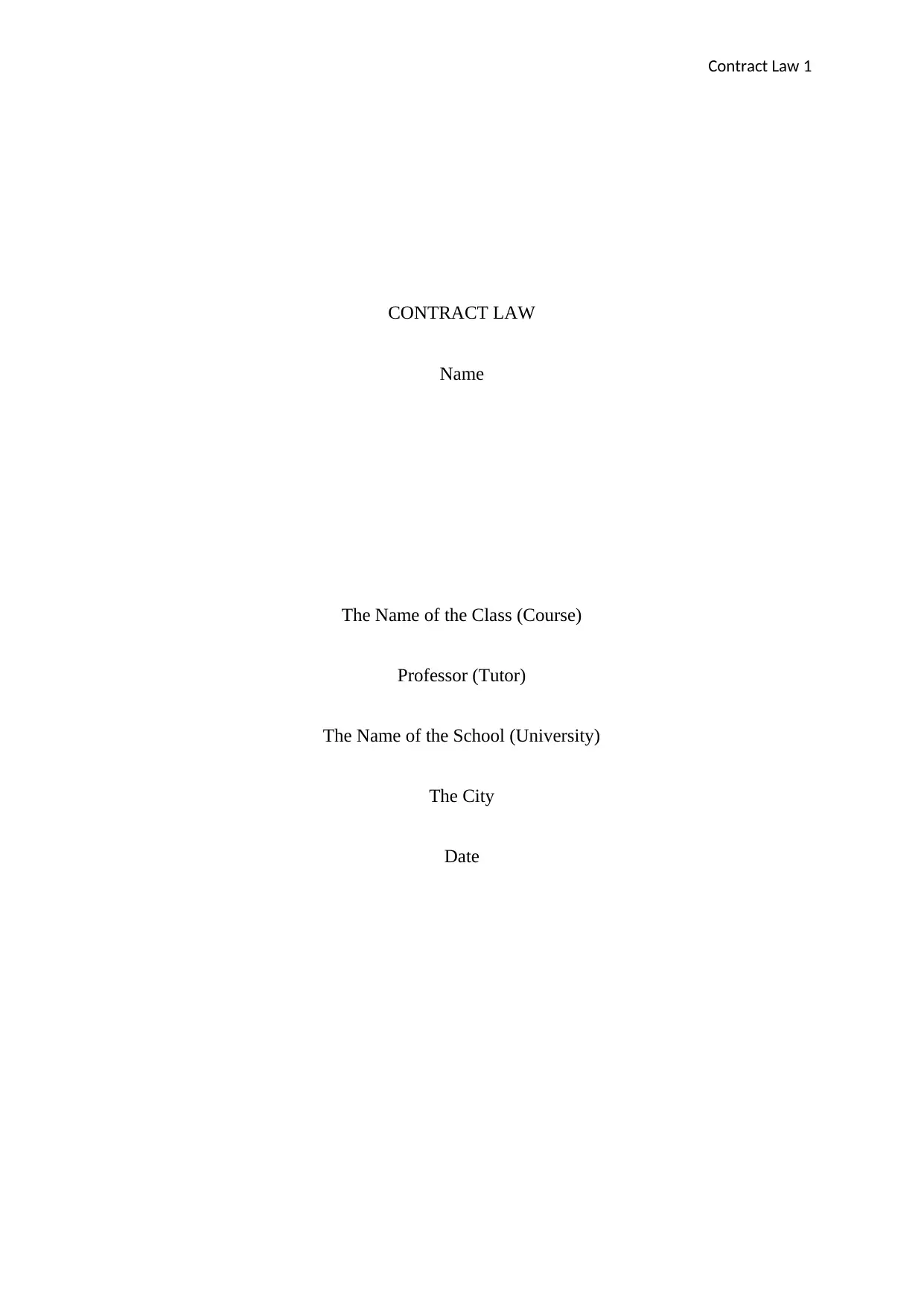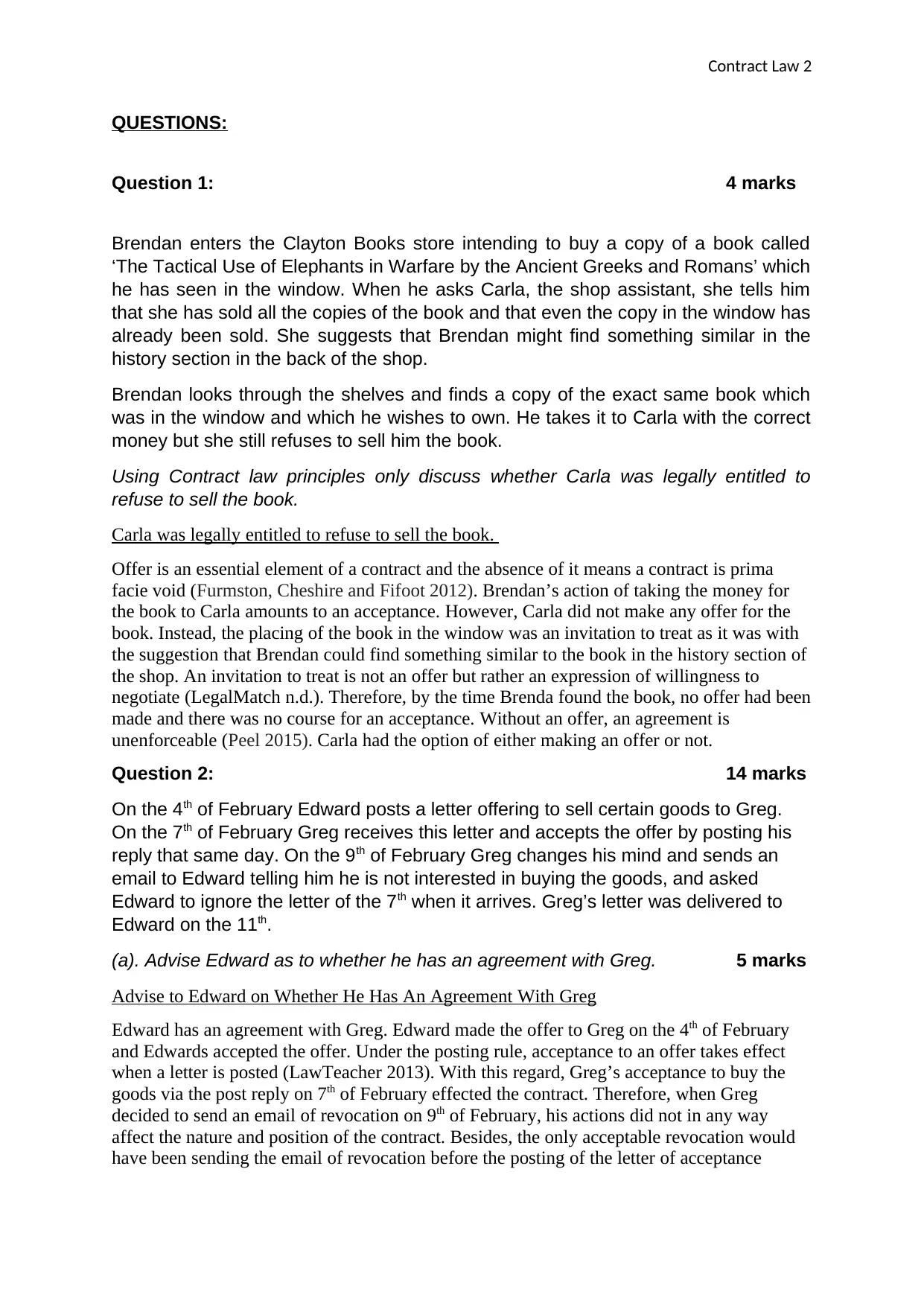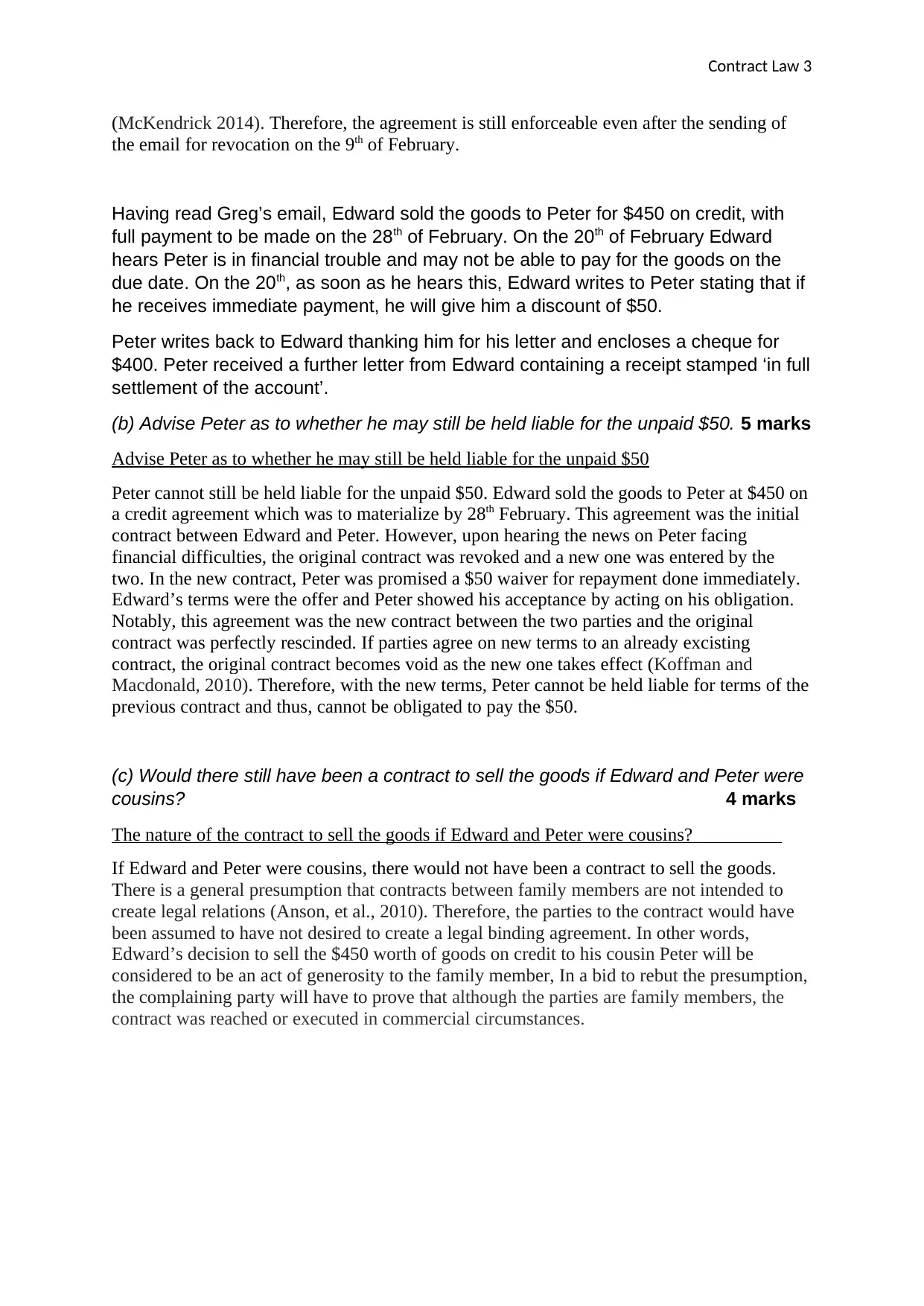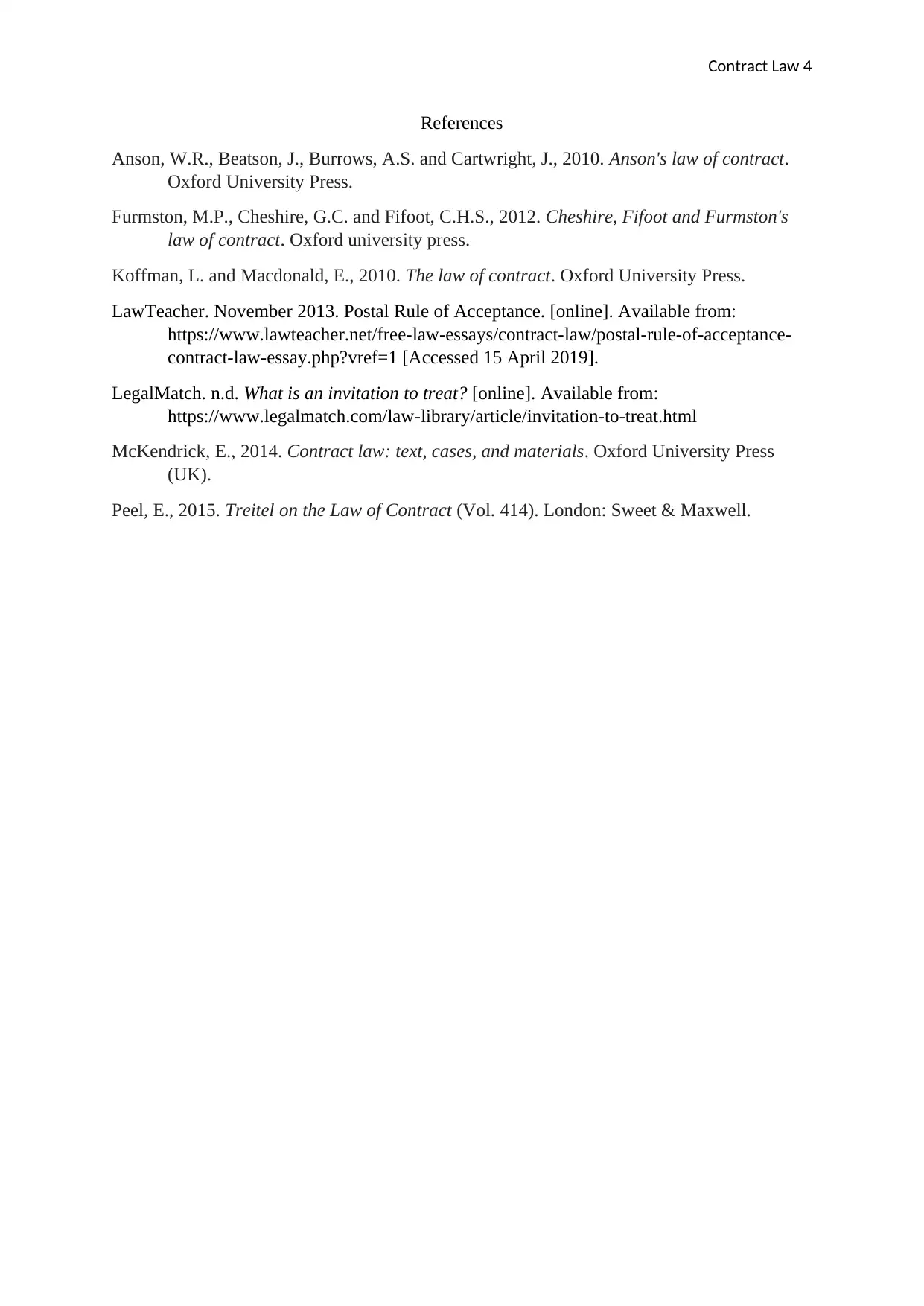Contract Law Assignment - Analysis of Offer, Acceptance and Contracts
VerifiedAdded on 2023/01/19
|4
|1357
|29
Homework Assignment
AI Summary
This document is a contract law assignment that addresses key elements of contract law, including offer, acceptance, and consideration, through the analysis of specific scenarios. The assignment explores whether a shop assistant was legally obligated to sell a book, considering the concept of an invitation to treat versus an offer. It then delves into the postal rule of acceptance, examining whether a contract was formed when an offer was made by post, and a subsequent revocation was sent via email. The assignment further analyzes a scenario involving a debt, exploring whether a debtor is still liable for the remaining amount after a partial payment and a new agreement. Finally, it considers the impact of familial relationships on the formation of a legally binding contract, specifically if the parties involved were cousins. The document provides a comprehensive understanding of contract law principles and their application in various contexts. The assignment includes detailed explanations and references to legal principles and case law, offering a thorough analysis of the questions posed.

Contract Law 1
CONTRACT LAW
Name
The Name of the Class (Course)
Professor (Tutor)
The Name of the School (University)
The City
Date
CONTRACT LAW
Name
The Name of the Class (Course)
Professor (Tutor)
The Name of the School (University)
The City
Date
Paraphrase This Document
Need a fresh take? Get an instant paraphrase of this document with our AI Paraphraser

Contract Law 2
QUESTIONS:
Question 1: 4 marks
Brendan enters the Clayton Books store intending to buy a copy of a book called
‘The Tactical Use of Elephants in Warfare by the Ancient Greeks and Romans’ which
he has seen in the window. When he asks Carla, the shop assistant, she tells him
that she has sold all the copies of the book and that even the copy in the window has
already been sold. She suggests that Brendan might find something similar in the
history section in the back of the shop.
Brendan looks through the shelves and finds a copy of the exact same book which
was in the window and which he wishes to own. He takes it to Carla with the correct
money but she still refuses to sell him the book.
Using Contract law principles only discuss whether Carla was legally entitled to
refuse to sell the book.
Carla was legally entitled to refuse to sell the book.
Offer is an essential element of a contract and the absence of it means a contract is prima
facie void (Furmston, Cheshire and Fifoot 2012). Brendan’s action of taking the money for
the book to Carla amounts to an acceptance. However, Carla did not make any offer for the
book. Instead, the placing of the book in the window was an invitation to treat as it was with
the suggestion that Brendan could find something similar to the book in the history section of
the shop. An invitation to treat is not an offer but rather an expression of willingness to
negotiate (LegalMatch n.d.). Therefore, by the time Brenda found the book, no offer had been
made and there was no course for an acceptance. Without an offer, an agreement is
unenforceable (Peel 2015). Carla had the option of either making an offer or not.
Question 2: 14 marks
On the 4th of February Edward posts a letter offering to sell certain goods to Greg.
On the 7th of February Greg receives this letter and accepts the offer by posting his
reply that same day. On the 9th of February Greg changes his mind and sends an
email to Edward telling him he is not interested in buying the goods, and asked
Edward to ignore the letter of the 7th when it arrives. Greg’s letter was delivered to
Edward on the 11th.
(a). Advise Edward as to whether he has an agreement with Greg. 5 marks
Advise to Edward on Whether He Has An Agreement With Greg
Edward has an agreement with Greg. Edward made the offer to Greg on the 4th of February
and Edwards accepted the offer. Under the posting rule, acceptance to an offer takes effect
when a letter is posted (LawTeacher 2013). With this regard, Greg’s acceptance to buy the
goods via the post reply on 7th of February effected the contract. Therefore, when Greg
decided to send an email of revocation on 9th of February, his actions did not in any way
affect the nature and position of the contract. Besides, the only acceptable revocation would
have been sending the email of revocation before the posting of the letter of acceptance
QUESTIONS:
Question 1: 4 marks
Brendan enters the Clayton Books store intending to buy a copy of a book called
‘The Tactical Use of Elephants in Warfare by the Ancient Greeks and Romans’ which
he has seen in the window. When he asks Carla, the shop assistant, she tells him
that she has sold all the copies of the book and that even the copy in the window has
already been sold. She suggests that Brendan might find something similar in the
history section in the back of the shop.
Brendan looks through the shelves and finds a copy of the exact same book which
was in the window and which he wishes to own. He takes it to Carla with the correct
money but she still refuses to sell him the book.
Using Contract law principles only discuss whether Carla was legally entitled to
refuse to sell the book.
Carla was legally entitled to refuse to sell the book.
Offer is an essential element of a contract and the absence of it means a contract is prima
facie void (Furmston, Cheshire and Fifoot 2012). Brendan’s action of taking the money for
the book to Carla amounts to an acceptance. However, Carla did not make any offer for the
book. Instead, the placing of the book in the window was an invitation to treat as it was with
the suggestion that Brendan could find something similar to the book in the history section of
the shop. An invitation to treat is not an offer but rather an expression of willingness to
negotiate (LegalMatch n.d.). Therefore, by the time Brenda found the book, no offer had been
made and there was no course for an acceptance. Without an offer, an agreement is
unenforceable (Peel 2015). Carla had the option of either making an offer or not.
Question 2: 14 marks
On the 4th of February Edward posts a letter offering to sell certain goods to Greg.
On the 7th of February Greg receives this letter and accepts the offer by posting his
reply that same day. On the 9th of February Greg changes his mind and sends an
email to Edward telling him he is not interested in buying the goods, and asked
Edward to ignore the letter of the 7th when it arrives. Greg’s letter was delivered to
Edward on the 11th.
(a). Advise Edward as to whether he has an agreement with Greg. 5 marks
Advise to Edward on Whether He Has An Agreement With Greg
Edward has an agreement with Greg. Edward made the offer to Greg on the 4th of February
and Edwards accepted the offer. Under the posting rule, acceptance to an offer takes effect
when a letter is posted (LawTeacher 2013). With this regard, Greg’s acceptance to buy the
goods via the post reply on 7th of February effected the contract. Therefore, when Greg
decided to send an email of revocation on 9th of February, his actions did not in any way
affect the nature and position of the contract. Besides, the only acceptable revocation would
have been sending the email of revocation before the posting of the letter of acceptance

Contract Law 3
(McKendrick 2014). Therefore, the agreement is still enforceable even after the sending of
the email for revocation on the 9th of February.
Having read Greg’s email, Edward sold the goods to Peter for $450 on credit, with
full payment to be made on the 28th of February. On the 20th of February Edward
hears Peter is in financial trouble and may not be able to pay for the goods on the
due date. On the 20th, as soon as he hears this, Edward writes to Peter stating that if
he receives immediate payment, he will give him a discount of $50.
Peter writes back to Edward thanking him for his letter and encloses a cheque for
$400. Peter received a further letter from Edward containing a receipt stamped ‘in full
settlement of the account’.
(b) Advise Peter as to whether he may still be held liable for the unpaid $50. 5 marks
Advise Peter as to whether he may still be held liable for the unpaid $50
Peter cannot still be held liable for the unpaid $50. Edward sold the goods to Peter at $450 on
a credit agreement which was to materialize by 28th February. This agreement was the initial
contract between Edward and Peter. However, upon hearing the news on Peter facing
financial difficulties, the original contract was revoked and a new one was entered by the
two. In the new contract, Peter was promised a $50 waiver for repayment done immediately.
Edward’s terms were the offer and Peter showed his acceptance by acting on his obligation.
Notably, this agreement was the new contract between the two parties and the original
contract was perfectly rescinded. If parties agree on new terms to an already excisting
contract, the original contract becomes void as the new one takes effect (Koffman and
Macdonald, 2010). Therefore, with the new terms, Peter cannot be held liable for terms of the
previous contract and thus, cannot be obligated to pay the $50.
(c) Would there still have been a contract to sell the goods if Edward and Peter were
cousins? 4 marks
The nature of the contract to sell the goods if Edward and Peter were cousins?
If Edward and Peter were cousins, there would not have been a contract to sell the goods.
There is a general presumption that contracts between family members are not intended to
create legal relations (Anson, et al., 2010). Therefore, the parties to the contract would have
been assumed to have not desired to create a legal binding agreement. In other words,
Edward’s decision to sell the $450 worth of goods on credit to his cousin Peter will be
considered to be an act of generosity to the family member, In a bid to rebut the presumption,
the complaining party will have to prove that although the parties are family members, the
contract was reached or executed in commercial circumstances.
(McKendrick 2014). Therefore, the agreement is still enforceable even after the sending of
the email for revocation on the 9th of February.
Having read Greg’s email, Edward sold the goods to Peter for $450 on credit, with
full payment to be made on the 28th of February. On the 20th of February Edward
hears Peter is in financial trouble and may not be able to pay for the goods on the
due date. On the 20th, as soon as he hears this, Edward writes to Peter stating that if
he receives immediate payment, he will give him a discount of $50.
Peter writes back to Edward thanking him for his letter and encloses a cheque for
$400. Peter received a further letter from Edward containing a receipt stamped ‘in full
settlement of the account’.
(b) Advise Peter as to whether he may still be held liable for the unpaid $50. 5 marks
Advise Peter as to whether he may still be held liable for the unpaid $50
Peter cannot still be held liable for the unpaid $50. Edward sold the goods to Peter at $450 on
a credit agreement which was to materialize by 28th February. This agreement was the initial
contract between Edward and Peter. However, upon hearing the news on Peter facing
financial difficulties, the original contract was revoked and a new one was entered by the
two. In the new contract, Peter was promised a $50 waiver for repayment done immediately.
Edward’s terms were the offer and Peter showed his acceptance by acting on his obligation.
Notably, this agreement was the new contract between the two parties and the original
contract was perfectly rescinded. If parties agree on new terms to an already excisting
contract, the original contract becomes void as the new one takes effect (Koffman and
Macdonald, 2010). Therefore, with the new terms, Peter cannot be held liable for terms of the
previous contract and thus, cannot be obligated to pay the $50.
(c) Would there still have been a contract to sell the goods if Edward and Peter were
cousins? 4 marks
The nature of the contract to sell the goods if Edward and Peter were cousins?
If Edward and Peter were cousins, there would not have been a contract to sell the goods.
There is a general presumption that contracts between family members are not intended to
create legal relations (Anson, et al., 2010). Therefore, the parties to the contract would have
been assumed to have not desired to create a legal binding agreement. In other words,
Edward’s decision to sell the $450 worth of goods on credit to his cousin Peter will be
considered to be an act of generosity to the family member, In a bid to rebut the presumption,
the complaining party will have to prove that although the parties are family members, the
contract was reached or executed in commercial circumstances.
⊘ This is a preview!⊘
Do you want full access?
Subscribe today to unlock all pages.

Trusted by 1+ million students worldwide

Contract Law 4
References
Anson, W.R., Beatson, J., Burrows, A.S. and Cartwright, J., 2010. Anson's law of contract.
Oxford University Press.
Furmston, M.P., Cheshire, G.C. and Fifoot, C.H.S., 2012. Cheshire, Fifoot and Furmston's
law of contract. Oxford university press.
Koffman, L. and Macdonald, E., 2010. The law of contract. Oxford University Press.
LawTeacher. November 2013. Postal Rule of Acceptance. [online]. Available from:
https://www.lawteacher.net/free-law-essays/contract-law/postal-rule-of-acceptance-
contract-law-essay.php?vref=1 [Accessed 15 April 2019].
LegalMatch. n.d. What is an invitation to treat? [online]. Available from:
https://www.legalmatch.com/law-library/article/invitation-to-treat.html
McKendrick, E., 2014. Contract law: text, cases, and materials. Oxford University Press
(UK).
Peel, E., 2015. Treitel on the Law of Contract (Vol. 414). London: Sweet & Maxwell.
References
Anson, W.R., Beatson, J., Burrows, A.S. and Cartwright, J., 2010. Anson's law of contract.
Oxford University Press.
Furmston, M.P., Cheshire, G.C. and Fifoot, C.H.S., 2012. Cheshire, Fifoot and Furmston's
law of contract. Oxford university press.
Koffman, L. and Macdonald, E., 2010. The law of contract. Oxford University Press.
LawTeacher. November 2013. Postal Rule of Acceptance. [online]. Available from:
https://www.lawteacher.net/free-law-essays/contract-law/postal-rule-of-acceptance-
contract-law-essay.php?vref=1 [Accessed 15 April 2019].
LegalMatch. n.d. What is an invitation to treat? [online]. Available from:
https://www.legalmatch.com/law-library/article/invitation-to-treat.html
McKendrick, E., 2014. Contract law: text, cases, and materials. Oxford University Press
(UK).
Peel, E., 2015. Treitel on the Law of Contract (Vol. 414). London: Sweet & Maxwell.
1 out of 4
Related Documents
Your All-in-One AI-Powered Toolkit for Academic Success.
+13062052269
info@desklib.com
Available 24*7 on WhatsApp / Email
![[object Object]](/_next/static/media/star-bottom.7253800d.svg)
Unlock your academic potential
Copyright © 2020–2026 A2Z Services. All Rights Reserved. Developed and managed by ZUCOL.





